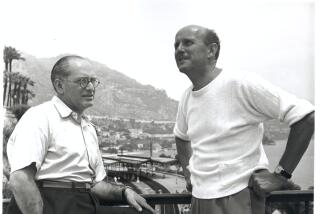MOVIE REVIEWS : Three Glimpses of Scorsese’s Roots as a Man and a Filmmaker
- Share via
Two early, vivid documentary portraits by Martin Scorsese are here briefly (at the Nuart today and Thursday): the homey and revealing “Italianamerican,” made at Scorsese’s parents’ apartment on Elizabeth Street in Little Italy, and the serio-hilarious “American Boy,” the best, worst and funniest highlights of the drug-drenched ‘70s, recounted masterfully by techie/roadie/sometime actor Steven Prince.
In “Italianamerican,” Catherine and Charles Scorsese, perched together on their living room sofa, are at first as stiff as the protective plastic that covers it, but their son has a nice way of coaxing out the stories that obviously filled his and his brother’s childhood. What emerges--through disputes about whose father’s homemade wine was better and Mrs. Scorsese’s bustling trips to the kitchen to tend to her spaghetti and meatballs--is a sense of family, of history, of neighborhood and of Italian-American culture sturdy as a grape vine and as tough. (Sauce recipe given before the credits and clearly worth jotting down.)
Rich and affectionate, this short film works like the back story to Scorsese’s “Mean Streets” or to the Little Italy sequences of “Godfather II”: Charley Scorsese explaining that all the families in the building were virtually one; if his mother’s dinner didn’t sound promising, he could always scramble downstairs to another that suited him better. His family of seven took in two boarders for whom his mother also cooked and washed; Catherine’s nine-member family was self-contained--”We had more money” she teases--with a generous supply of older kids to look after the younger ones.
Scanning these faces, watching the connections between son and mother, between husband and wife and back to their own parents, is like seeing a Jacob Riis photograph pop to life. And with the stories of one wave of immigrants elbowing out the wave before them comes a sense of continuity that’s almost mythic. There’s drama of a different sort over at “American Boy,” as Scorsese, no slouch as a storyteller himself, surrenders the floor at a fellow actor’s house in Hollywood to Steven Prince, whose life has barely known a quiet moment and apparently never a dull one. The vastly likable Prince, who played the speed-talking gun dealer in “Taxi Driver,” has a little of the qualities of “Parting Glances” actor Steve Buscemi: same huge lemur eyes, same frail frame, same nice flair for irony.
As he did in “Raging Bull,” Scorsese uses home movies of Prince and his family as a sort of visual counterpoint to Prince’s wild, collectable stories. Prince was an Army brat in Great Neck, Long Island, with serious Hollywood relations--his uncle was Abe Lastfogel, who ran the William Morris Agency for 60 years. He was a backstage techie on the New York theater scene when he was 18 and Neil Diamond’s road manager when he was 21 years old. About that time, there was his period of serious heroin addiction, later kicked. Filter this through a dangerously wry sensibility, add Neil Young’s “Time Fades Away” on the sound track, with Scorsese as the guiding hand behind it all, and you have a fair idea of the ineffably tacky pleasures of “American Boy.
In answer to the obvious question that arises, Prince is reportedly alive and well today in Texas.
A third relatively unavailable film on the bill is Scorsese’s 1967 “The Big Shave,” a black and bloody six-minute comedy about a morning shave that is enough to make one reach for a stypic pencil--fast.
More to Read
Only good movies
Get the Indie Focus newsletter, Mark Olsen's weekly guide to the world of cinema.
You may occasionally receive promotional content from the Los Angeles Times.










